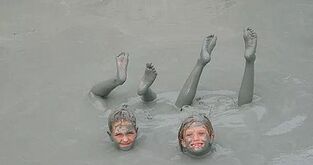
Psoriasis is one of the most misunderstood diseases. The cause of the disease, or its cure, is not known. It is believed that it is impossible to achieve complete psoriasis cure, therefore the main goal of therapy is to achieve stable long-term remission and reduce the frequency of deterioration. Because the disease requires dietary correction, lifestyle, systematic use of medications and non-pharmacological agents, psoriasis is mainly treated at home.
Causes and signs of psoriasis
Psoriasis is a chronic pathology with a recurrent course. The disease can affect various organs and tissues, but the main manifestation of psoriasis is dermatology. Red lesions are poured on the skin, which tends to grow and unite with each other. Their surface is covered with gray scales, which are easily scraped off, showing wet shiny spots with "bloody dew" dots beneath them.
The most common localizations of psoriatic plaque are the knees and elbows, the scalp, the area behind the ears, the lower back. The rash is most often accompanied by itching, tightness, and discomfort in the affected area.
The appearance of psoriasis is associated with stress, with recent infectious diseases, allergies, endocrine pathology, but, according to many experts, it is based on genetic defects. One of the above factors is simply the "trigger" that triggers the body's abnormal response mechanism to external stimuli.
Due to failure, the process of splitting epidermal cells is disrupted. The rate of death and desquamation of surface cells increased by 4 - 5 times compared to the normal cycle. As a result, scales that do not have time for exfoliation naturally form a hard growth - plaque.
Rules for the treatment of psoriasis at home
Psoriasis treatment covers two areas:
- symptomatic- elimination of acute symptoms of the disease (external agents, antihistamines, physiotherapy);
- pathogenetic:diet, body desensitization, cleansing measures, hormone therapy, and so on.
In severe cases, treatment in stationary conditions is indicated, it is possible to use hormone medication and serious basic therapy. The rest, the patient fights the disease itself, choosing the most effective method through trial and error.
Psoriasis is a disease that does not have a one-size-fits-all solution. Medications appropriate for one patient can aggravate the other. Here, more than ever before, an individual approach is needed, but there are general principles that must be followed to successfully treat psoriasis at home:
- Listen to your body. No one except you can identify all the factors that trigger the increase of psoriasis and find a remedy that will work well on your plaque.
- It is best to do self-treatment under the supervision of a dermatologist. Do not give up on tests, procedures and medications prescribed by a specialist.
- With mild forms of psoriasis, good results can be achieved by eliminating provoking factors and using non-drug treatments, including folk remedies. If the manifestations of the disease are very noticeable, and psoriasis persists, "heavy artillery" in the form of hormones and cytostatics may be required, strictly according to the doctor's prescription.
- Consistency and regularity are important in the treatment of psoriasis. You should not stop using effective medications when the first results appear. A large number of drugs require a long course, first therapy, then - "improve".
- It is important to maintain normal skin moisture, prevent scratches, trauma, and inaccurate crust removal. The plaque can only be cleaned after the initial softening and only if it can be done without effort.
- Many treatments cannot be used during the acute phase. Insulation, climate change, spa procedures, some ointments should be used only with the onset of stationary levels.
Psoriasis treatment: how to exacerbate plaque?
The most popular and effective treatments for psoriasis on the skin are ointments and pharmaceutical creams. A large number of topical preparations have serious side effects and must be used with caution. This is especially true for hormonal ointments, but regarding non-hormonal problems it is best to consult a doctor and adhere to the recommendations for its use strictly.
Hormone ointment
Hormonal agents in the treatment of psoriasis are indicated for persistent skin symptoms that do not respond to the influence of other therapies. The advantage of this drug is that it acts fast. The patient's condition improves literally before our eyes, but this effect is deceptive. After stopping use, the plaque not only returns but becomes stronger. Hormone ointments are addictive, and with prolonged use - damage to the kidneys, liver, cardiovascular system, thinning and atrophy of the skin. There is also a fear that hormone-based drugs "push" psoriasis into the body, and the disease manifests itself in a more serious form - psoriatic arthritis.
The effects of addiction and withdrawal make hormone ointment an unwanted treatment. If possible, it is recommended to avoid its use. If necessary, use for a short time, cancel gradually.
Today, several groups of drugs are prescribed in the treatment of psoriasis:
- Triamcinolone ointment.They have antihistamine, antipruritic, anti-inflammatory effects. They can cause local reactions, changes in skin structure, atrophy.
- Products with the active ingredient flumethasone.Reduces itching, has anti-exudative effect. Affects the skin negatively, over time can cause systemic disorders.
- Hydrocortisone ointment.Reduces capillary permeability, relieves impaired focus swelling, but with prolonged use there is a risk of systemic disorders.
- Preparation based on metamethason.They have anti-inflammatory and anti-exudative effects. Suppresses the process of accelerated epithelial cell desquamation. Skin disorders and systemic problems are possible.
Non-steroidal drugs
Non-hormonal ointment is the treatment of choice for psoriasis. They do not act as fast and strong as hormones, but the effects are more persistent and long lasting. Non-steroidal ointments can be used for a long time without fear of addiction and the development of negative consequences.
In psoriasis, drugs with different compositions and effects are used, most of which are combined with each other. The main group of ointments used:
- Salisilik.The acid in it softens the plaque and helps cleanse the skin. Reduces inflammation, acts as an antiseptic. The drug is usually prescribed to remove scales, and then the affected area is treated with another drug with medicinal ingredients.
- Zink.Dry rash, relieves inflammation and skin irritation, creates a protective film that prevents negative effects on the affected area from the outside.
- Tar.Ointment with the addition of birch, pine, coal tar has anti-inflammatory and disinfectant effects. They stimulate blood circulation, increase the healing of damaged skin. To get rid of plaque, you can add pure tar while making your own medicine. Ointments with tar can be poorly tolerated, so they begin to apply it on small areas in test mode. With good tolerance, the dose is increased. Tar increases skin sensitivity, which can cause sun allergies in summer.
- Enrichment ointment D.Calcipotriol-based preparations have proven themselves well in the treatment of psoriasis. They suppress proliferation, reduce plaque and prevent it from reappearing. They do not cause atrophic processes. If there is an effect, they provide a stable remission. Recommended for use in conjunction with UV therapy, combination with salis salis is contraindicated.
- Oil-based ointment.Exfoliates plaque, relieves itching and inflammation, but requires careful use. With increased sensitivity, it can lead to worsening skin manifestations in psoriasis, furunculosis. These funds are contraindicated in patients with anemia, kidney disease. Treatment with these drugs is done outside the exacerbation stage.
- Vitamin products.Ointment with vitamins activates metabolic processes in the skin, restores tissue trophism, promotes regrowth, eliminates exfoliation, slows down keratinization of cells. Retinoids and preparations based on vitamin E, A have such properties.
- Solid ointment.Effective agent with significant anti-inflammatory, keratolytic, antipruritic effect. Penetrates deep into the skin and normalizes metabolic processes in it. They are used for a long time, if there are no allergies. This ointment should not be combined with hormonal ointments, and alcohol should be avoided during treatment.
Psoriasis: Treatment from within
It is difficult to overcome the manifestations of psoriasis with external agents only. It is also necessary to act from within: to concentrate, to improve digestion.
- During exacerbations, antihistamines are shown to help relieve itching, eliminating the influence of provoking factors. In addition to the anti-allergic effect, such drugs have a calming effect.
- Body detoxification is done with the help of sorbents.
- The use of enzymes is recommended to improve digestion.
- In psoriasis, liver support is important: hepatoprotectors are taken in the course.
- "Psoriasis" should be calm. Stress is one of the factors that trigger psoriasis. The disease itself, in turn, can cause neurological problems: anxiety, insomnia, and so on. Herbal sedatives are recommended.
- NSAIDs can help relieve pain in psoriasis-related joints.
The emergence of focal infections in the body can cause the worsening of psoriasis. Infectious diseases and acute inflammation must be treated with antibiotics, as prescribed by a doctor.
How to treat scalp psoriasis at home: features
ICH psoriasis is the most troublesome for patients. It is more difficult to treat it than open skin, because the presence of hair requires a special approach to therapy and the use of special methods.
Treatment of psoriasis on the head at home consists of the use of shampoo, pharmaceuticals and alternative methods. Skin lesions can be mild, in the form of separate spots, or severe. In severe cases, the head is covered with so-called "crowns" or "helmets" - hard, itchy and scaly psoriatic scabies, especially along the border of hair growth on the forehead, behind the ears, on the neck.
In any case you can not comb and "choose" dry crust. They should be softened with a special keratolytic shampoo, cleansing mask, and then gently remove the loose scales from the skin.
Wash your hair for psoriasis as often as needed. It is best to use a special or neutral shampoo. The second group includes products for children and adults for sensitive skin. They are free from fragrances, dyes and other harmful substances.
From the shampoo you can use:
- Tar.This product contains coal tar, which gives it a dark color and a distinct odor. This shampoo is not well tolerated, so testing is required. Drug cosmetics are sold in pharmacies.
- Zink.They contain zinc-pyrithione, which cleans the scalp from dead scales and reduces its volume, relieving itching. If allantoin, an emollient, is added to a shampoo, it helps reduce dry skin and heals damage more quickly. Some medications are designed to treat dandruff, but can be used for milder psoriasis.
- Antijamur.Ketoconazole shampoo reduces exfoliation and itching, and eliminates fungal infections on the scalp.
In psoriasis, it is advisable not to wash the shampoo immediately, but keep it for a few minutes to a few hours, so that the medicine substance can penetrate deeper. The head should be washed gently without scratching the skin. After rinsing the shampoo, rinse with cold water acidified with vinegar. Avoid using a hair dryer.
Normal ointment is not suitable for lubricating plaque on the head. Hair is too oily, sticky and does not wash well. It is better to buy medicines in the form of creams, lotions, emulsions or aerosols - many manufacturers produce their products in a form suitable for the treatment of ICH psoriasis.

Treatment of psoriasis on the head at home successfully carried out with the help of folk remedies: masks and rinses.
Popular Recipes:
- to soften the crust, rub the oil mixture into the scalp: base (olive, burdock) and essential (tea tree, rosemary, fir), put on a hat and leave until morning;
- make pasta from white or red clay with the addition of oil, spread on the head overnight;
- rub fresh onion juice into the skin;
- rinse with decoction of nettle, chamomile;
- mix grape, almond oil and coconut oil in a ratio of 1: 1: 2 (in a tablespoon), add 1 tsp. cognac and honey, a few drops of lavender oil, mix thoroughly in a water bath, apply on head for 2 hours;
- Exfoliate the scalp with sea salt with essential oils (eucalyptus, tea tree) - rub and massage gently with your fingertips for 5 minutes, then wash your hair;
- prepare a mask: burdock oil, 2 egg yolks, marigold alcohol, a few drops of tar, and continue on the head for 2 - 3 hours.
Home Treatment for Nail Psoriasis
When psoriasis strikes nails, they become brittle, wavy, and discolored. These nails should be protected from external influences:
- do homework with gloves;
- leave manicure trim;
- cut short nails after soaking them in water;
- use a protective healing varnish.
Home treatment for nail psoriasis includes:
- Acceptance of vitamin and mineral complexes that strengthen nail plates, protect cell membranes from damage (vitamins C, E, calcium).
- The most effective hormonal ointment for nail treatment. When glucocorticosteroids are rubbed into the nail plate, it is practically not absorbed into the skin and does not penetrate into the bloodstream, therefore, its use is safe for 2 to 4 weeks.
- To strengthen and moisturize nails, it is necessary to rub it daily with sea buckthorn oil (3 times a day) and vitamin A. oil.
- For whitening and strengthening nail plates, it is recommended to bathe in warm water with corn flour or oatmeal, celandine infusion, nettle, rope.
Home treatment for psoriasis treatment

Herbal infusion is one of the most popular home treatments for psoriasis:
- Mix 1 tbsp in an thermos overnight. l. flax seeds (per glass of water). Before going to bed, drink 2 tablets of activated charcoal, take the infusion in the morning, eat the seeds. This recipe helps detoxify the body, helping to reduce the intensity of disease symptoms.
- Broth from the collection: elecampane root (10 gr. ), calamus (12 gr. ), St. John's wort (15 gr. ) And celandine (5 gr. ). Mix 300 ml of hot water in a thermos, leave for 3 hours. Strain, take 100 ml 2 times a day.
- 4 hb. l. boil the plow seeds in a liter of water over low heat for 60 minutes. Strain and drink every hour with a spoon with excessive pressure, 4 times a day - in remission.
- Birch mushrooms (100 gr. ) Mix with hot water overnight. In the morning, grind the chaga and pour the remaining water heated to 50 degrees, leave for three days. Strain, take 100 ml before each meal.
Effectively cleanses plaque skin, relieves itching and baths:
- with sage broth, string, celandine, St. John's wort;
- with sea salt;
- with blue clay;
- with baking soda
- with potato starch;
- with turpentine.
Before bathing, shower, then pour water at a comfortable temperature (not hot), dilute the composition of the medicine. Bath time - 15 - 20 minutes, of course - every day.
To lubricate the plaque, you can use fresh celandine juice or prepare an ointment: mix the ground dried ingredients with petroleum jelly or baby cream.
Proven butter butter (5 parts) with propolis (1 part). Put in a water bath, stir well and cool. Lubricate the plaque with hydrogen peroxide before use.
Diet for psoriasis
Psoriasis is often associated with food allergies. Many patients know exactly which foods cause it to deteriorate. Others believe that diet does not significantly affect their condition. In any case, it is recommended to follow a diet, at least during deterioration:

- excluding cocoa, chocolate;
- reject coffee;
- do not eat spicy foods;
- avoid preservatives and other additives;
- limit citrus fruits, red vegetables and fruits;
- alcohol is strictly prohibited (especially beer).
Beyond anxiety, the diet can be expanded with "harmful" products, but at the same time closely monitor skin reactions.
Through diet, healthy lifestyle, and home treatment for psoriasis, long-term forgiveness can be achieved. But if folk remedies clearly do not help, you should "give up" to a dermatologist and not give up the procedures and medicines he offers. After relieving the joy with the help of official medicine at home, it will be easier to engage in anti-relapse prevention.























